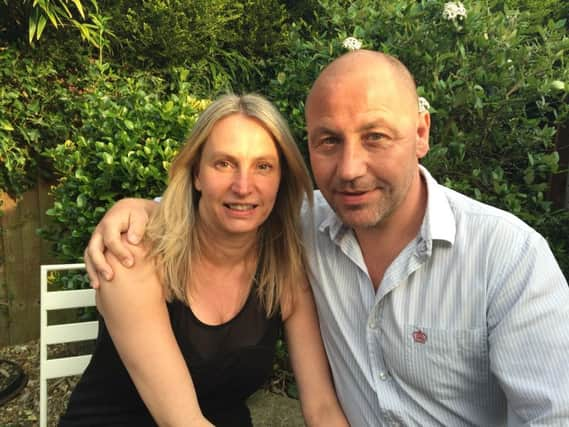Feature: '˜The day that changed my life'


Only weeks before, he had been celebrating his milestone 50th birthday with friends and family, planning for a new chapter, when life threw the book at him.
Clambering out of bed gets harder as you get older but this day was different.
Advertisement
Hide AdAdvertisement
Hide AdCarl, who lives in Edwinstowe near his partner Paula Webster, says: “I felt woozy and woke with a headache as though I had been drinking.
“I stumbled over, but dismissed it and thought the feeling would shake off with the trip to the gym we had planned for that morning.”
The couple, together with two of Paula’s three boys, piled into the car for the school run that would be like no other.
Paula says: “Carl pulled out of the drive and started driving down the wrong side of the road.
Advertisement
Hide AdAdvertisement
Hide Ad“I said ‘what are you doing’, but he didn’t realise where he was.
“I told him to stop the car and we switched seats, but he didn’t seem himself.”
The boys were dropped at school and the pair arrived for their workout.
Paula says: “As we walked to the gym entrance, Carl was veering to one side away from the door and I realised something was very wrong.”
Advertisement
Hide AdAdvertisement
Hide AdCarl went to King’s Mill Hospital in Sutton and was transferred to a hospital trolley.
He says it was the start of a long journey he had never planned to make.
A stroke was diagnosed, but not the typical type which features on awareness adverts.
According to the Stroke Association, a stroke is a brain attack when the blood supply to part of your brain is cut off.
Advertisement
Hide AdAdvertisement
Hide AdBlood carries essential nutrients and oxygen to your brain. Without blood your brain cells can be damaged or die.
This damage can have different effects, depending on where it happens in your brain.
A stroke can affect the way your body works as well as how you think, feel and communicate.
Carl says: “The part of my brain affected was responsible for my vision primarily.
Advertisement
Hide AdAdvertisement
Hide Ad“I could hardly see anything on those first few days, but, gradually, my sight did improve.”
Despite the initial improvements, hope of a return to full vision has not materialised so far and Carl is now registered as partially sighted, as well as having cognitive changes and dizzy spells.
Paula, aged 46, says: “He is unable to drive, which means he has lost a lot of his independence.”
Driving was crucial to Carl’s career as he worked away in Wales from Monday to Thursday, before returning home for an extended weekend.
Advertisement
Hide AdAdvertisement
Hide AdCarl says: “Despite my employer’s best efforts, I had to admit I just couldn’t do what I had done before the stroke.
“This has been one of the hardest parts to deal with.”
Carl’s stroke survival journey with Paula has been an endless ride of physiotherapy, occupational therapy and soul searching with a psychologist, as the pair continue travelling along the road to re-discovery.
Carl, a proud father to Nottingham University student Jake, says: “We are still finding out the full extent of the effects my stroke is having on me.
“My head is doing its best to make lots of things really difficult and doing its best to push away some of the people I most want to stay close.”
Advertisement
Hide AdAdvertisement
Hide AdCarl and Paula’s relationship has been put to the test too.
Paula says: “Social situations are challenging, as Carl can get apprehensive and anxious in unfamiliar places and has lost a lot of his confidence.
“Life has changed a lot and our relationship has changed too.”
The couple were planning for their future together, making moves to build a home for their merged families and cementing their partnership before the stroke forced them to delay their future plans.
Advertisement
Hide AdAdvertisement
Hide AdCarl says: “Often we are losing our way and looking for some way back and any way forward. “I want to thank Paula for taking this journey with me, for finding a way for us to let go of what we were and for finding a way for us to hold on to what we can still be.”
Carl and Paula have received help, support and advice from the North Notts Stroke Family and Carer Support Service, based at King’s Mill Hospital.
Stephanie Morley, the co-ordinator, says the service has a lot to offer to people across Mansfield, Ashfield, Newark and the Sherwood district.
She says: “We work with a stroke survivor and their family immediately following a stroke and will continue to provide the support people need, for as long as they need it – within their own homes and back into the community.”
Advertisement
Hide AdAdvertisement
Hide AdCarl has now joined the service as a volunteer as a way of passing on his experience and empathy to other stroke survivors and as a way of increasing his own confidence and experience in a bid to get back into work.
The service was holding its own Make May Purple event at King’s Mill Hospital today, Wednesday, May 18, from 10am to 2pm in the foyer.
Stephanie says: “The volunteers will be manning a stand to raise awareness of stroke and the service as well as running a raffle to boost funding. “We also need more volunteers to help the service, so please come and offer your support.”
The Stroke Association is also asking schools, clubs, offices and organisations to support the campaign with fundraising around the purple theme.
Advertisement
Hide AdAdvertisement
Hide AdStephanie says: “Whether it’s holding a bake sale, signing up to an event or getting sponsored to dye your hair, there are many ways for everyone to get involved. The main thing is to have fun, get people talking about Make May Purple and raise funds.”